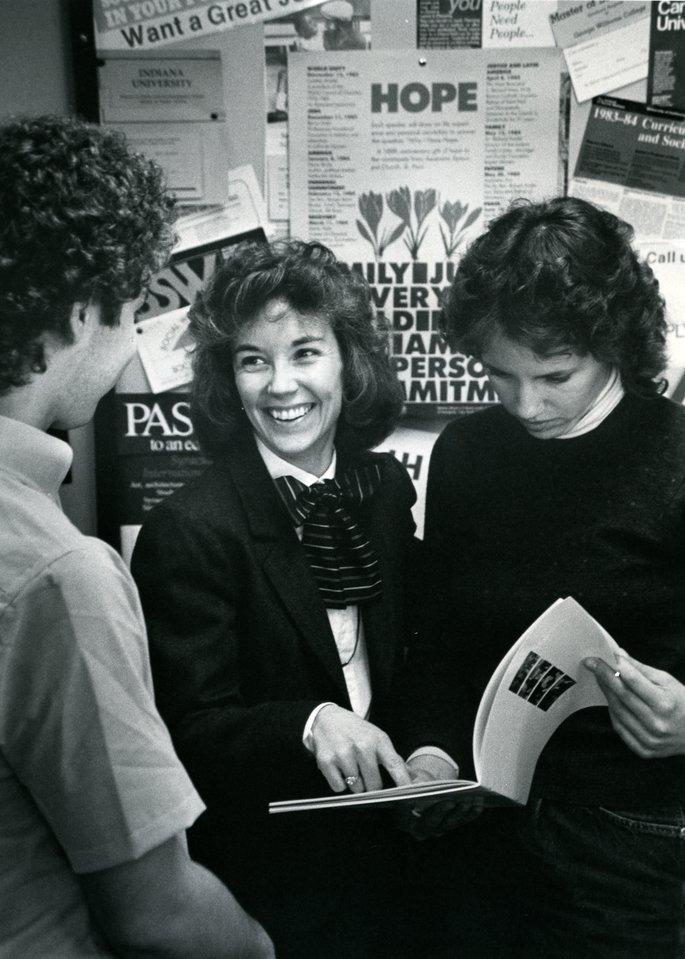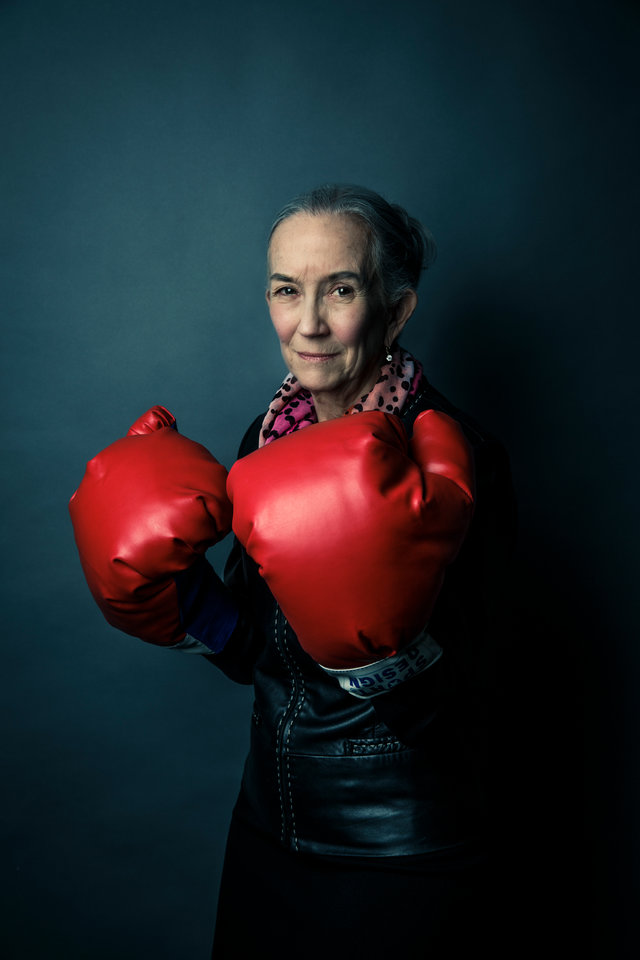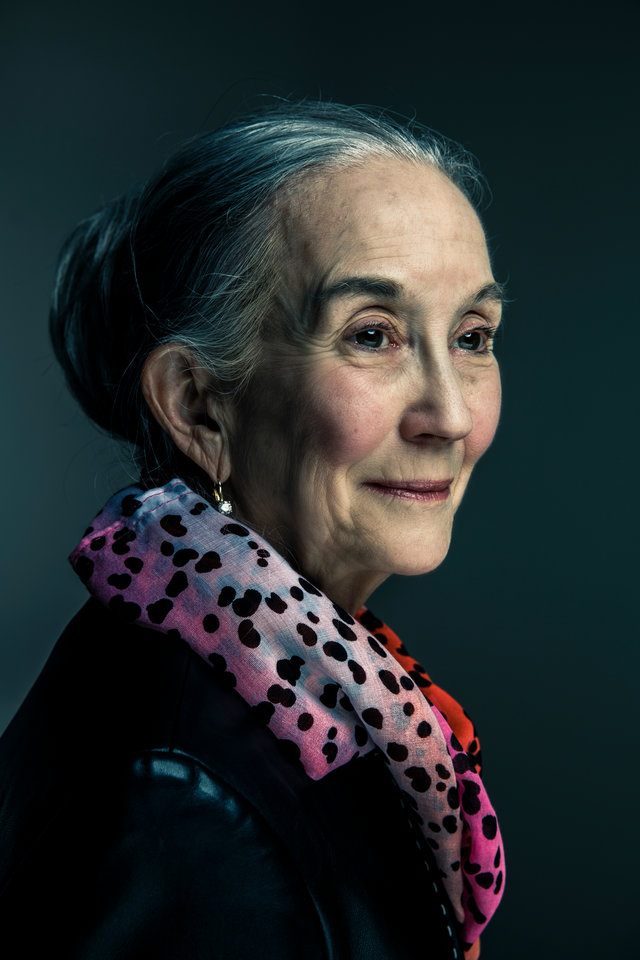Around the state, the country, the world, Dr. Barbara Shank has had such an impact in her nearly 40 years with the St. Catherine-St. Thomas School of Social Work that her name is synonymous with the program.
“She is the School of Social Work,” said adjunct professor Mary Tinucci, who earned her doctorate in social work in May to complete the school’s “triple crown”: undergraduate, graduate and doctoral degrees in social work all at St. Kate’s-St. Thomas.
“It’s been a marvel, really, to witness her energy and her staunch determination. She may be one of the most determined people I’ve ever met,” said associate professor Mari Ann Graham, citing the many issues that come with leading a joint school. “She’s fiercely loyal to the School of Social Work, as well as to our two institutions. She’s fiercely loyal to us as faculty members; she really goes to bat for the school. It’s something to just witness that sort of determination and stamina.”
Shank has been a leader of social work education within the program – as well as nationally and internationally – since 1978, when she was one of the founding faculty members of the social work program at St. Catherine. Shank led the development of the master’s in social work degree that began in 1990, and was the founding dean when the program evolved into the School of Social Work in 1996. Shank also oversaw the school’s launch of its online doctoral program in 2014 – the first of its kind in the country – and has helped make St. Kate’s-St. Thomas one of the premier places in the country for social work education.

Shank received the Distinguished Service Award during the 2017 graduate commencement ceremony. (Photo by Mark Brown)
“Her legacy is huge,” said Cindy Lorah, director of marketing and recruitment for social work. “People know of our program and think highly of it on a national level because she is such an advocate for not only our school, but social work and social work education overall. ... Our doctoral program sums up the importance of social work education as part of social work practice. People will always associate our program with Barbara.”
Shank will retire at the end of the 2018 academic year, having built a school ranked in the top third in the country for social work by U.S. News & World Report, a credit to the overall quality that has come together under her guidance. Her departure prompted many to reflect on all she has meant to social work education, especially at the School of Social Work, the only joint program between St. Thomas and St. Catherine. Next year will mark her 70th birthday and exactly 40 years since she left her job as a probation officer doing court mediations for Ramsey County to start her education career.
“I knew as soon as I got [to my teaching position] I was never going back,” Shank said.
A lifetime of service
Shank earned her sociology degree in 1970 from Macalester College. She was motivated by a course in social welfare history that featured a lecture on the Elizabethan Poor Laws, which began in the early 17th century as a way to lift people out of poverty.
“It was a fit for me, what social work is about, what social workers do,” she said. “I knew then I wanted to be a social worker as my profession.

Shank sits with her fellow deans at the 2013 inauguration of President Julie Sullivan.
“The worse social problems get in this country, in the world, the more we need social workers. Social workers are the workforce who deal with people who have the challenging issues. Social workers provide over 60 percent of the mental health services in this country, more than psychologists, psychiatrists, therapists combined. The country needs this workforce, desperately,” Shank added. “Social workers want to make the world better. That can be through the kids, families, communities they’re advocating for, the clinical work they do – they want to make a difference in people’s lives.”
Shank earned her master’s degree from the University of Minnesota (as well as a Ph.D. there in 1993) before a two-year contract with the budding St. Catherine Social Work Department turned into the start of a career’s work in education. She rose through the ranks and was dean of the School of Social Work starting in 1996.
Shank said each step for the School of Social Work has been a natural one and a matter of “evolving to meet the community’s needs, which is what St. Thomas and St. Catherine are all about.
“It’s all been a collaborative effort, a partnership with my colleagues,” she added. “It’s all about what we’ve done and what we’ve built together. It’s just been incredible.”
The vast majority of those colleagues were hired by Shank, and their collective excellence is a testament to her, said associate professor Mary Ann Brenden.
“She built a very strong faculty. While this is a big change for her to leave and move on, the faculty that she has built and attracted to our program is equipped to carry on these programs and they will continue to be enriched,” Brenden added. “It’s very competitive these days in social work education, so drawing a strong faculty is not an easy task. She’s done a great job of that.”
“It’s all been a collaborative effort, a partnership with my colleagues,” she added. “It’s all about what we’ve done and what we’ve built together. It’s just been incredible.”
Advocating for students
As her leadership roles expanded into administration and focused on higher-level issues for the school, Shank was unique in that “she’s still as strong of a student advocate as anyone on our faculty. ... She is the sort of dean who has always been accessible to our students and has been an advocate for our students,” Graham said.

Shank talks with students in 1983.
Shank said she has valued remaining a part of the faculty throughout her career (“I’m prouder of the title of professor than I am of dean,” she said), which allowed her to help shape the lives of countless students.
“Barbara just always has my back. She’s always been supportive,” said Tinucci, who took classes with Shank both as an undergraduate and in the doctoral program. “She was always rooting for us. She’s always supporting my capacity to be a competent social worker.”
“She encouraged me all along with the idea that social work is not just about being a social worker, that there are all sorts of ways someone can use a social degree,” said Joy Bartscher, a judge in the Second Judicial District and a 1986 alumna of the School of Social Work. “Being involved with social work throughout the years, it’s clear St. Thomas and St. Kate’s have made a commitment to those ideas of fairness and justice. And that’s in large part because of Barbara and how she approaches social work, and treating people with dignity and respect.”
“It’s fair to say she’s been an inspiration to not only members of our own faculty, but to social work educators across the country,” Graham added. “That’s not exaggerating her impact, not even a little bit.”
A global influence
Shank has been a tireless supporter of social work education on the local, national and international levels, helping further a multifaceted approach to the field.
“Social work has multiple components ... advocacy and pursuit of social justice, in addition to direct service, working with individuals. People think that it’s only one thing, only clinical, therapeutic kind of work. It’s not,” Shank said. “You have to understand the importance and relevance of policy to your clients, have to understand the environment and how organizations and communities work. It’s that integrated perspective of the profession.”
Shank has an extensive leadership resume with the Council on Social Work Education, International Schools for Social Work, and the International Consortium for Social Development, among others, as well as her role in the accreditation process reviewing some 300 programs around the country. In those roles and at the School of Social Work she has contributed an immense amount of teaching, research and overall advocacy of social work.
“She has helped to advance the eld nationally and internationally. That work has been a great source of pride and speaks really well to our missions at St. Thomas and St. Kate’s,” Brenden said. “Barbara is a visionary. She has always had a really clear sense of the importance of the profession of social work, and the important role that it plays in our institutions at St. Catherine and St. Thomas, and the important role that it plays in our world.”
Shank’s passion and body of work have been lauded throughout her career. She earned widespread recognition from organizations throughout the educational and social work landscapes, including recently being named a Social Work Pioneer by the National Association of Social Workers, and receiving the Significant Lifetime Achievement Award from the Association of Baccalaureate Program Directors.
“If you’re insular and only involved in your own school, you don’t know what’s going on in the world. When you participate and get involved in national activities ... you get a lay of the land and see what other people are doing, which is always eye-opening and either affirms what you’re doing or makes you think twice about it. Being involved in a leadership capacity at a national level has informed what I and we have done [at the School of Social Work],” Shank said.

Round two
Shank’s time as dean ended this May and she is spending the next year archiving the history of social work at St. Kate’s-St. Thomas. Her stepping away from the role of dean also coincided with the D.S.W. program’s first graduating class, timing that represents a fitting completion to one of the many areas of growth that Shank championed here.
There’s no doubt that Shank’s impact will continue to be felt in the School of Social Work for a long time.
“I love what I do. If I wasn’t 70, I could do this for another 20 years. At some point it’s time to sign out and move on,” Shank said.
“I’m very proud of the School of Social Work and what we’ve been able to do. When I came here there were four of us [faculty] and 50 students, now we have 31 and over 600 students. It’s been great to be a part of.”
Read more from St. Thomas magazine.


